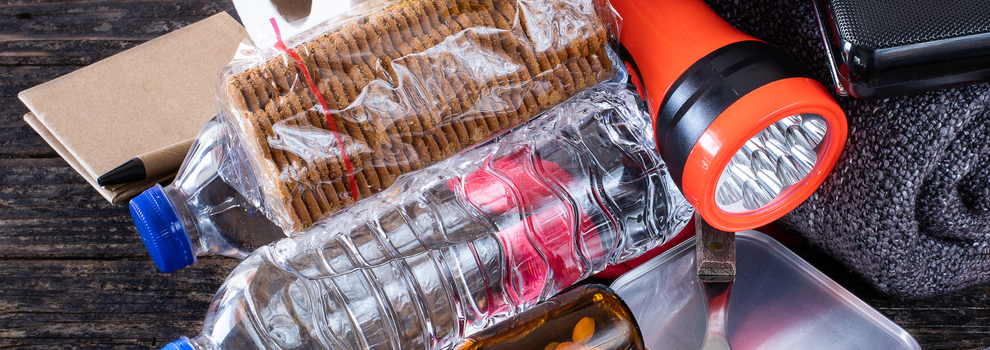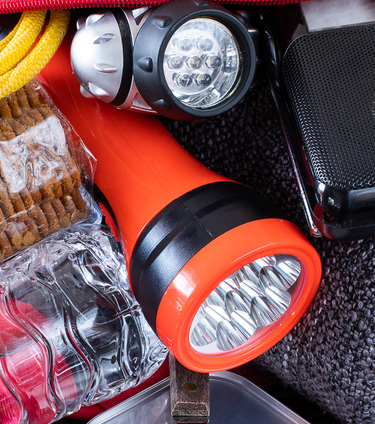

Make a Plan Beforehand
Natural disasters don't announce themselves, so it's important to disaster prep and plan ahead. According to the Centers for Disease Control and Prevention, it's important to know how to take action, engage your community and have a predetermined strategy for staying healthy, informed, connected and calm during an emergency.
When you live in an area prone to harsh weather like the PNW, create a communication and disaster plan for your family ahead of time. It may take some effort upfront, but it will certainly pay off if and when you need it.
Prepare Your Home and Car for Extreme Weather
First things first, repair any roof leaks and insulate the walls and water lines that run along the exterior. If you have a chimney or flue, you'll want to have it inspected — particularly if you plan on using a fireplace or wood stove to keep warm during an emergency.
In addition to keeping your car in good working condition, it's smart to create an emergency car kit. These in-vehicle kits are a good idea for any time or situation but prove especially important in the event of an emergency.
Consider adding the following items to your car kit:
- Cell phone and portable charger
- Flashlight & extra batteries
- Battery-powered radio (with extra batteries)
- Water and snacks
- First Aid Kit with a pocket knife
- Tow chains or rope
- Canned compressed air with sealant for emergency tire repair
- Booster cables (with a fully charged battery) or jumper cables
- Hazard reflectors
- Emergency distress flag and/or emergency flares
- Road maps
Specifically for the winter months, it is good to keep the following in your car:
- Cold-weather clothing, like hats, coats and mittens
- Extra blankets
- Waterproof matches
- Windshield scraper
- Snow shovel
- Tire chains
- Cat litter or sand to help tires get traction
- Road salt to melt ice
- Can to melt snow into usable water
Create an At-Home Emergency Kit
When considering how to prepare for a natural disaster, it's essential to have a readiness kit at home that could help you and your family in the event of a flood, earthquake, power outage or storm. If wind or snow knock out power lines, you could lose access to heat, gas, water, electricity and any appliances that power them, like stoves and ovens, for several days. If a flood or earthquake requires you to leave your house, you'll also want to have emergency food, water and a hygiene kit to bring along when you evacuate.
Here's what we recommend for your at-home preparation kit:
- Water: It may seem like a lot, but it's recommended that you have a gallon of water per person per day. Remember that besides drinking the water, you may also be using it to prepare food and wash your hands. Save money (and plastic!) by stocking up on large, multi-gallon water containers instead of small bottles.
- Food: Pre-packaged snacks, canned food, peanut butter, nutrition bars, crackers and other non-perishable food items that require little to no preparation. If you have pets, be sure to have additional pet food for them.
- Medications: Both prescription and over-the-counter meds, like pain relievers. You may also want to keep a stash of iodine tablets for water purification.
- First Aid kit: Either buy one of the pre-made first aid kits or make your own.
- Hygiene kit: This might include body cleaning wipes, deodorant, a toothbrush and feminine care products.
- Battery-powered hand-crank radio: Ensure it's battery-powered, so it can work without electricity.
- Flashlights & extra batteries: In addition to having them for flashlights, get extra batteries for the radio and any other items you may want to use, like children's toys.
- Battery-powered lantern: A battery-powered lantern can be even handier than flashlights because they can be set down so your hands are free.
- Candles: Candles (and waterproof matches) will work in a pinch, but never leave them unattended.
- Emergency blankets: Purchase a proper emergency blanket or store a selection of fleece and flannel blankets.
- Hot water bottle: A hot water bottle can be filled with hot water (that's been boiled on the grill, if necessary) to help you stay warm.
- Portable grill: If you don't already own a large standing BBQ, the small portable ones used for summer grilling and camping can also be used to prepare meals during power outages.
- Battery-powered chargers for electronics: Keep your phone charged to stay connected to friends/family and to receive weather updates on your phone. Even if you lose Wi-Fi, you may still have cell phone coverage.
- Products for babies and young children: Pack baby food, powdered formula, diapers, baby wipes and anything else your little one may need.
- Important documentation: passports, birth certificates, bank account information, and any other information
Staying Safe and Protected
Keep in mind this is not an exhaustive list; think about what else you and your family might want or need in case of an emergency. Other items to consider might include beverages like instant coffee or black tea, books and magazines, playing cards, and other forms of entertainment in case you find yourself stuck indoors for an extended period.
You can utilize the offerings at Bartell's to equip yourself and your loved ones with all the emergency essentials. Ultimately, being proactive and well-prepared can make all the difference in ensuring a comfortable experience for you and your family during any and all situations.



